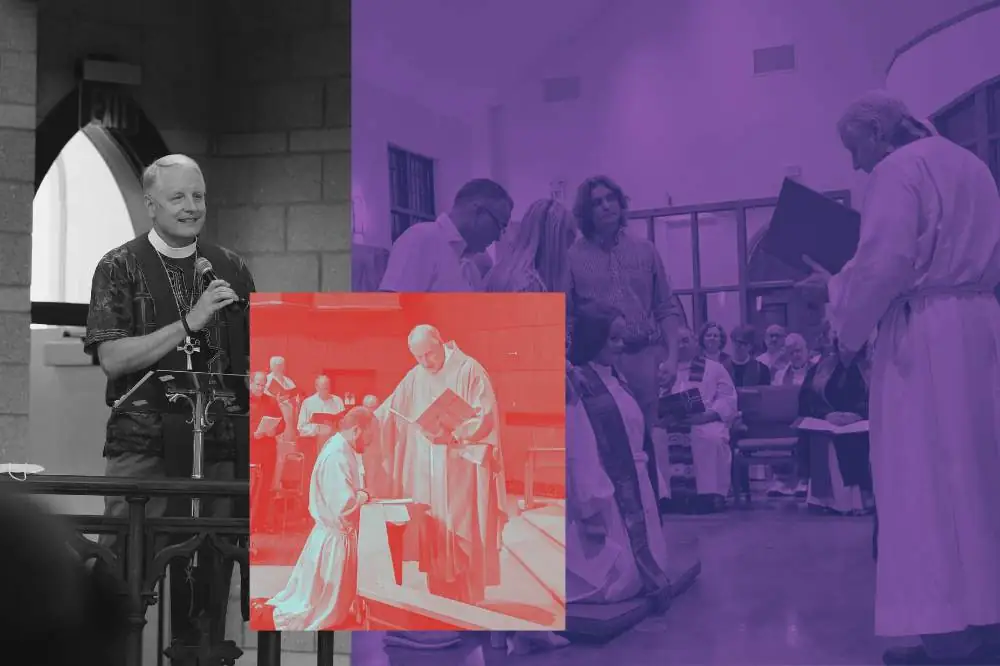As I write, a resolution is pending in the U.S. House of Representatives this week essentially condemning Bishop Budde of the Episcopal Church, USA—our closest colleague in shared ministry—for her sermon given at the unity service her cathedral hosted for the nation. Franklin Graham’s earlier extremely political prayer at the inauguration that resonated and blessed the opposite end of the political spectrum notwithstanding, both the president and his supporters were quick to criticize and insult Bishop Budde for mixing religion and politics. Her transgression? Begging the most powerful man in the world for mercy for the persecuted, the poor, the oppressed, the marginalized. How dare she?
From where I sit, I can only stand in awe of her bravery and commitment to the Gospel as I understand it. Please understand that I, and Bishop Budde, and countless others who serve in professional ministry, as well as among the baptized in other vocations who lift up the poor and oppressed, draw our convictions not from political platforms or parties but from careful study of Scripture and the life of Jesus that urge us on to justice and mercy.
Leviticus was clear that we must welcome the stranger. Micah, Isaiah, Amos, Hosea, and others were scathing in their indictment of Israel’s failing to care for the widow and orphan—the poor and powerless among them. Isaiah 61:1 makes it clear that “The Spirit of the Lord God is upon me because the Lord has anointed me; he has sent me to bring good news to the oppressed, to bind up the brokenhearted, to proclaim release to the captives.” Nathan the prophet called out King David for abusing his power for personal gratification. God, through the burning bush, compelled Moses to speak a word of truth to power in demanding of Pharoah, “Let my people go!” Hebrew prophetic justice—as opposed to the Greek “You get what you deserve”—has more of a flavor of “Everyone has what they need.” Like Micah 6:8’s call to “Do justice, love kindness, and walk humbly with your God.”
That clarion call to care for those on the margins continued with Jesus. His mother, while pregnant, rejoiced that God has “Cast down the mighty from their thrones, lifted up the lowly, filled the hungry with good things, sent the rich away empty.” In Matthew 25, Jesus insists that “Insofar as you have done it for the least of these, you have done it unto me.” In Luke, the beatitudes proclaim, “Blessed are the poor.” Jesus eats with sinners, touches lepers and the unclean, intentionally seeks out the Gentile, the woman, the outcast. This good news of God is for all. For the woman caught in adultery, for poor Lazarus by the gate of the rich man, for countless others, Jesus pleads for mercy. Even on the cross, he prays for mercy for the executioners who “know not what they do.”
If we start with politics and seek a religion to bless what you wanted to hear in the first place, we can find it. Even Billy Graham warned us about religion that weds a particular political platform or party. I would hope that Bishop Budde would have included that very same plea for mercy to a new administration of the opposite political persuasion. Because to the best of her ability, and mine, and your pastor’s, we are trying to proclaim Christ. We may debate HOW and what the government’s role is in showing mercy, but THAT we pursue mercy is a given for us Lutheran ministers. For and to the far left, the far right—to all.
Lastly, everyone in the Lutheran Church who gets confirmed/affirms their faith commits “to serve all people, following the example of our Lord Jesus, and to strive for justice and peace in all the earth” and 7.31.02.8 of the ELCA Constitution, 37 years old, requires of all its clergy that they “speak publicly to the world in solidarity with the poor and oppressed, advocating dignity, justice, and equity for all people, working for peace and reconciliation among the nations, caring for the marginalized, and embracing and welcoming racially and ethnically diverse populations.” Not doing so is both scriptural and constitutional violation.
If that constitution isn’t to your liking, you can work to change it. But the Scriptures, those don’t change. When things get divided, “back to the basics” is a good mantra for people of faith. So studying the life, death, and resurrection of Jesus and the Holy Scriptures is a good place to return. Or to start. If the Gospel and the prophetic tradition are foundational and central to us, then I trust God’s Spirit to help me—help you—connect the dots.
Walking with you,





